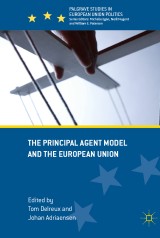Details

The Principal Agent Model and the European Union
Palgrave Studies in European Union Politics
|
117,69 € |
|
| Verlag: | Palgrave Macmillan |
| Format: | |
| Veröffentl.: | 16.10.2017 |
| ISBN/EAN: | 9783319551371 |
| Sprache: | englisch |
Dieses eBook enthält ein Wasserzeichen.
Beschreibungen
<p>This book assesses the use and limitations of the principal-agent model in a context of increasingly complex political systems such as the European Union. Whilst a number of conceptual, theoretical and methodological challenges need to be addressed, the authors show that the principal-agent model can still provide deeper insights into a wide range of political phenomena. Through an empirical analysis of multiple principal-agent relations in the EU, covering a variety of policy fields and political actors, the volume refines our theoretical understanding of the politics of delegation and discretion in the EU. It will appeal to scholars in interested in EU politics and policy, public administration and governance, and international organisations.<br/><br/>The chapter ‘Multiple principals preferences, different types of oversight mechanisms, and agent’s discretion in trade negotiations’ is published open access under a CC BY 4.0 license via link.springer.com.<br/></p><p></p><p></p>
<div>Preface - <i>Mark Pollack.- </i>1. Introduction - <i>Tom Delreux and Johan Adriaensen</i><i>.- </i>2. The principal-agent model, accountability and democratic legitimacy - <i>Gijs Jan Brandsma and Johan Adriaensen</i><i>.- </i>3. Non-exclusive delegation to the European External Action Service - <i>Hylke Dijkstra</i>.- 4. Direct and indirect control on the Council by the European Council - <i>Daniella Kroll</i><i>.- </i>5. Effects of contestation within a collective agent in EU trade policy-making - <i>Markus Gastinger</i><i>.- </i>6. Agent interaction as a source of discretion for the High Representative - <i>Niklas Helwig</i>.- 7. Impact of the agent’s environment on discretion in the field of EU conflict resolution - <i>Arne Niemann and Friedrich Planck</i><i>.- </i>8. Multiple principals preferences, different types of oversight mechanisms, and agent’s discretion in trade negotiations - <i>Eugenia da Co</i></div>nceicão-Heldt<i>.- </i>9. Agents as information asymmetry managers in EU trade policy-making - Evelyn Coremans and Bart Kerremans<i>.- </i>10. Process-tracing as a tool to analyse discretion - <i>Yf Reekers and Derek Beach</i><i>.- </i>11. Conclusions - <i>Johan Adriaensen and Tom Delreux.- </i>Index.
<p>Tom Delreux is Professor of EU Politics at the Institut de Sciences Politiques Louvain-Europe (ISPOLE) at the University of Louvain (Louvain-la-Neuve), Belgium.</p><p> Johan Adriaensen is Research Coordinator at the Center for European Research in Maastricht (CERiM) at Maastricht University, the Netherlands.</p>
<p>This book assesses the use and limitations of the principal-agent model in a context of increasingly complex political systems such as the European Union. Whilst a number of conceptual, theoretical and methodological challenges need to be addressed, the authors show that the principal-agent model can still provide deeper insights into a wide range of political phenomena. Through an empirical analysis of multiple principal-agent relations in the EU, covering a variety of policy fields and political actors, the volume refines our theoretical understanding of the politics of delegation and discretion in the EU. It will appeal to scholars in interested in EU politics and policy, public administration and governance, and international organisations. </p><p>The chapter ‘Multiple principals preferences, different types of oversight mechanisms, and agent’s discretion in trade negotiations’ is published open access under a CC BY 4.0 license via link.springer.com.<br/></p>
Analyses the uses and limitations of the principal-agent model in the study of EU politics Moves beyond old principal-agent models to understand ever more complex realities within the EU Offers a thorough empirical analysis covering a variety of policy fields and political actors Includes supplementary material: sn.pub/extras
<div>Analyses the uses and limitations of the principal-agent model in the study of EU politics<br/></div><div><br/></div><div>Moves beyond old principal-agent models to understand ever more complex realities within the EU <br/></div><div><br/></div><div>Offers a thorough empirical analysis covering a variety of policy fields and political actors</div>
“This book is a tour-de-force of the European Union’s increasingly complex architecture. But studying it through the lens of the principal-agent model brings order and clarity. Delreux and Adriaensen show how the careful application of a model to an entire empirical field not only provides a map for navigating the empirical terrain, but also enables theory development. Endeavors like this advance our discipline.” (Professor Jens Blom-Hansen, Aarhus University, Denmark) <p>“This important book develops the principal-agent model in new and significant directions. One of the key tools in political science emerges as a powerful and relevant model to tackle central issues for the discipline.” (Professor Mark Thatcher, London School of Economics, UK)</p>

















